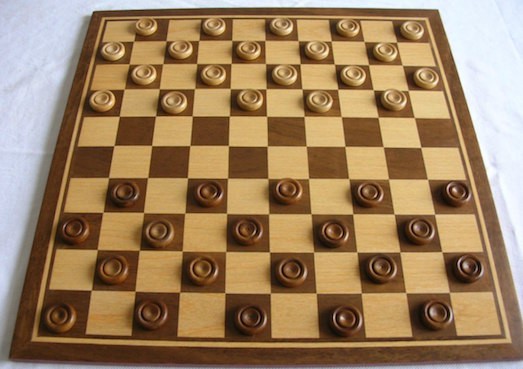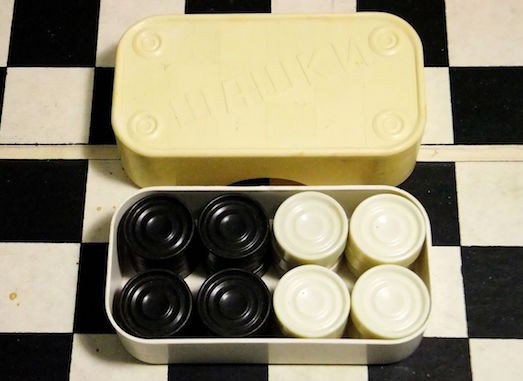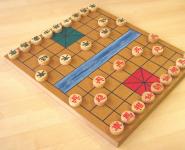How to quickly learn to play checkers well?
Each of us loves games, in fact, they accompany us from childhood, contributing to our physical, emotional, intellectual and spiritual development. There are many games, but few of them become really popular and even known to the whole world, checkers is one of them.
This simple, at first glance, game has many useful and positive qualities: it gives creative satisfaction, relaxes and allows you to forget about everyday fuss, develops intelligence and memory, makes it possible to learn to calculate ahead, and also trains the will well.
You might be surprised how all this is possible in such a primitive toy: one thing and know that move the round checkers on the black cells, trying to remove as many opponent's checkers from the field as possible. The rules are simple, they don’t cause any special difficulties for memorization, and only experienced players are well aware that the apparent elementality is deceptive, in fact, to win in checkers, it’s not enough just luck and knowledge of the basic rules.
In fact, this is a real art, with a bunch of combinations and tactics that can significantly increase the chances of winning. And here the question arises, how to learn to play checkers in such a way that always or at least, as often as possible, remain in the ranks of the winners, and not the losers?

So, if you are new to this business, then it will be useful to start with the simplest and even, perhaps, obvious for more experienced players.
- Study the rules of the game thoroughly: firstly, they may differ depending on the chosen type (Russian drafts, international, etc.). Try to practice as much as possible, read thematic literature and choose more experienced opponents. Of course, at first you will probably lose more, however, over time, the level of skill will only increase. There is even an opinion that you need to lose exactly 100 times in order to reach a good level. At the same time, these should not be thoughtless games, each time it is important to work on your mistakes, think about the reasons for the defeat and learn valuable lessons.
- In order not to forget the conclusions, you can write them down in a special notebook, enter the most interesting games from your point of view, as well as write out your own original ideas.
- To play checkers really well, it will not be superfluous to learn and remember a few successful win-win combinations. They represent a sequence of certain moves, as a result of which the player as quickly and successfully as possible approaches the goal - victory. Sometimes these actions consist in cunningly creating a threat to the opponent or, on the contrary, artificially sacrificing checkers in order to later take more checkers from the opponent or to achieve the kings. Some of these combinations will simply have to be memorized (from books or from a more experienced player), but in the future, with practice, you will learn how to create your own “fake maneuvers”.
- Try to calculate your own and your opponent's actions in advance: having guessed his combinations, it is much easier to protect your own pieces from possible risks and consequences.
- Always strive for one thing: that the opponent's checkers all the time become less on the board than yours. It seems to be a simple rule, but sometimes it can only be achieved with special techniques.
How to learn to play from scratch?

- Try to transfer as many simple checkers as possible to kings, which will significantly increase your chances of winning. Move your pieces to those places on the field where there are fewer opponent's checkers, or they are scattered as much as possible.
- Keep the last row of your own checkers in your positions for as long as possible - this will not allow your opponent to transfer his checkers to kings in the early stages of the game. Of course, you won't be able to hold it for the whole game, so if you have a convenient opportunity (for example, to exchange checkers with an opponent), don't be afraid to move your pieces from the last row.
- Try to move "in tandem" all the time, that is, move your checkers in pairs or even in small groups. This reduces the risk of falling into the traps of an opponent, and it also becomes possible to create your own.
- Sometimes it is wise to exchange checkers with your opponent, but you should only do this if it is beneficial for you.
- Try to always keep at least a few of your pieces in the center of the board - so you can, if necessary, quickly transfer your forces to a more advantageous position on the field. If the center of the field is occupied by the enemy, most of the advantage will be on his side.
We have listed only the simplest and most basic tricks that will help a beginner to master such an interesting game, as well as prepare the field for further development and improvement of their own skills. This can be achieved only with practice (if you do not have a permanent strong opponent, special computer programs can help you), as well as reading theoretical literature. Good luck!


